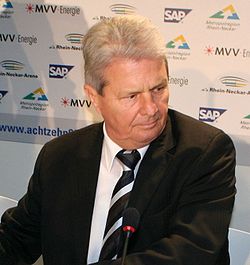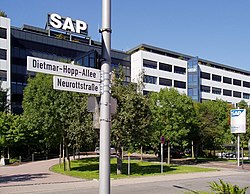Dietmar Hopp
Dietmar Hopp | |
|---|---|
 | |
| Born | 26 April 1940 Heidelberg, Germany |
| Nationality | German |
| Occupation | Businessman |
| Known for | Co-founder, SAP SE |
| Spouse | Anneliese Zeuner |
| Children | 2 sons |

Dietmar Hopp (born 26 April 1940) is a German software entrepreneur and billionaire. He was one of the founders of SAP SE in 1972 with other former IBM employees Hans Werner Hector, Klaus Tschira, Claus Wellenreuther and Hasso Plattner.
Early life and business career
Hopp grew up in Hoffenheim, a small village in Baden Württemberg, Southern Germany.[2] His father, Emil Hopp, was a Truppführer of the Nazi Party paramilitary organization Sturmabteilung, and led as a commanding officer destruction of a synagogue in Hoffenheim during the Kristallnacht pogrom in November 1938.[3]
After graduating from high school with an Abitur, he studied telecommunications engineering in Karlsruhe until 1966. After graduating from university, he worked as a software developer and consultant at IBM.
In 1972, he founded SAP SE with five other former IBM colleagues Hans Werner Hector, Klaus Tschira, Claus Wellenreuther and Hasso Plattner. He remained CEO of SAP SE (then SAP AG) from 1988 until 1998, chairman of its supervisory board from 1998 until 2003 and member of the board from 2003 until 2005. He kept about 10% of the company's shares after leaving the board.
He continues investing into various minor companies and his Dietmar-Hopp-Stiftung, a philantrophic foundation, has spent hundred of millions of Euros for medicine, education and other charity in the Rhine-Neckar metropolitan region.
TSG 1899 Hoffenheim
Hopp is the chief financial backer of the German football club TSG 1899 Hoffenheim, a club located close to his childhood home and which he played for as a teenager.
After suffering a devastating loss in 1990, Hopp decided to invest money into his former club, which was playing in the lowest tiers of the German football league system (Kreisliga) at that time. Due to his financial aid, the club became a major force in the region by the early 2000s, reaching Germany's third division (Regionalliga). In 2005, Hopp massively intensified his investments and aimed for the promotion to the Bundesliga, Germany's top division. Hopp spent large amounts of money on new players and coach Ralf Rangnick and Hoffenheim managed two consecutive promotions and eventually entered the Bundesliga in 2008, which it has played in since then.
Hopp also spent €100 million to build a new 30,000-seat stadium, the Rhein-Neckar-Arena near Sinsheim, for the club.
Altogether, Hopp has estimatedly invested more than €350 million into the club.[4]
Hopp and his influence on the club has been criticised since Hoffenheim's promotion to the Bundesliga. The club has been labeled as a plastic club[5], as its success is largely based on Hopp's financial aid. Hopp has been verbally attacked by other fans multiple times, leading to several arrests and fines.
Personal life
Hopp is married to Anneliese Zeuner, they have two sons, and live in Walldorf, Germany.[1][6]
References
- ^ a b "Forbes profile: Dietmar Hopp". Forbes. Retrieved 18 February 2020.
- ^ Dietmar Hopp. "Köpfe der Wirtschaft: Dietmar Hopp". WirtschaftsWoche (in German). Archived from the original on 29 April 2010.
- ^ Kreitling, Holger (11 February 2009). "Hoffenheim und die dunkle Seite der Familie Hopp" [Hoffenheim and the dark side of the Hopp family]. Die Welt (in German). Retrieved 1 March 2020.
- ^ "Dietmar Hopp: Geld für TSG 1899 Hoffenheim in Champions League". Manager Magazin (in German). 14 May 2018. Retrieved 13 March 2020.
- ^ Humphreys, Jason (11 February 2016). "The rise of TSG Hoffenheim: from ninth-tier amateurs to the Bundesliga". The Guardian. Retrieved 13 March 2020.
- ^ Öhlschläger, Andreas (22 September 2006). "Der Milliardär mit der großen Liebe zum Fußball" [The billionaire with a great love for football]. stimme.de (in German).
